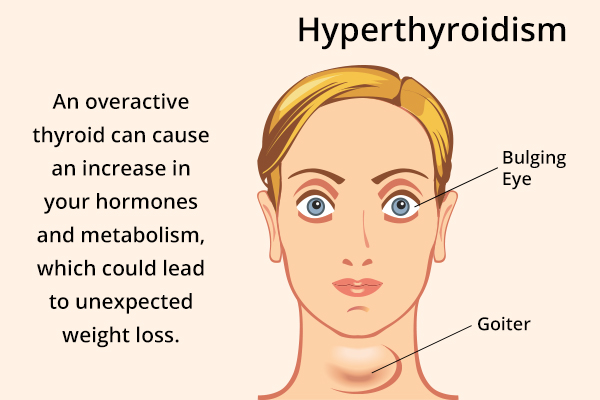In this article:
Limiting your calorie intake and exercising regularly are essential prerequisites for healthy weight loss. However, some people start shedding pounds despite any actual effort, which could point to an underlying medical problem that may be malignant or nonmalignant. (1)

Older adults are more prone to conditions that trigger unexplained weight loss such as endocrine disorders, psychiatric ailments, gastrointestinal problems, and cardiopulmonary disorders.
Drastic and sudden weight loss in geriatric patients can increase their morbidity and mortality risk, which is why a doctor must be seen about it without delay.
Note that losing 5% of your normal body weight in a period of 6–12 months is not normal and should be a cause for concern. Healthy weight loss is recommended to be 1–2 lbs per week. (2)
The Most Important Causes of Unintentional Weight Loss
As mentioned above, there can be several possible reasons behind unexplained weight loss, but some of them are more common and require special mentioning.
The following are ten important possible causes behind an unexplained weight loss:
1. Hyperthyroidism (an overactive thyroid gland)

The thyroid gland helps regulate your body temperature and controls your heart rate and metabolism. An overactive thyroid will cause an increase in your heart rate and metabolism, which could lead to unexpected weight loss. (3)
This can affect anyone, but it is more common in women than in men, typically between the ages of 20 and 40 years. Treatment is available for an overactive thyroid.
2. Diabetes
Diabetes can cause the pancreas to produce little to no insulin or make insulin that does not work as it should. This prevents the body from getting glucose from the blood into the body’s cells to use as energy, which then forces the body to start burning fat and muscle for energy, causing unexpected weight loss. (4)
3. Stomach ulcer or peptic ulcer disease (PUD)
PUD is a condition in which painful sores or ulcers develop in the lining of the stomach. This can be very painful and cause severe discomfort when eating, which can then lead to unexpected weight loss. (5)
4. Parasite infestation
There are so many different types of parasites that can invade the stomach and intestines, but a common symptom found in most parasitic infections is nausea and vomiting, much like food poisoning, leading to unexpected weight loss. (1)
5. Depression and/or stress

Depression can affect your eating habits, causing weight loss or weight gain.
Another factor that can affect your weight is antidepressants. According to a 2008 study, going through depressive episodes plummets your blood sugar levels below normal and inhibits thyroid function to trigger sudden weight loss. (6)
Your body can go into a fight-or-flight response to stress, which can then cause your heart to beat faster. This changes how the gut digests food and alters blood glucose levels and thus can play a part in unexplained weight loss.
6. Cancer
When cancer is present, the body produces cytokines, a substance that can lead to weight and muscle loss and decreased appetite, causing unexpected weight loss. (7) Another factor for weight loss in cancer comes from the treatments.
7. Crohn’s disease
Crohn’s disease is a lifelong form of inflammatory bowel disease affecting the intestines, causing severe discomfort, loss of appetite, and diarrhea. Because of the severe symptoms, most individuals with Crohn’s disease suffer from malnutrition, which can lead to weight loss. (8)
8. Tuberculosis

Tuberculosis (TB) leads to symptoms such as appetite loss, nausea, and severe abdominal pain, all of which hamper nutritional intake and trigger unintended weight loss.
When you are not eating well, your body starts burning the fat reserves in the body for energy. The gradual depletion of body fat decreases the concentration of leptin hormone in the blood plasma, which is needed for immunity.
Plus, the chronic inflammation associated with TB can further reduce leptin synthesis in the body. Low leptin levels can diminish your body’s ability to fight tuberculosis, resulting in a more severe form of the disease that will in turn lead to more unwanted weight loss. (9)
9. Dementia and Alzheimer’s disease
Eating and drinking, along with other daily tasks, become difficult for individuals with dementia and Alzheimer’s disease, which can lead to malnutrition and weight loss. (10)
Many times, the weight loss may set in only in the later stages of dementia when the patients develop swallowing or chewing difficulties that keep them from eating properly.
The lack of nutrition can drain their body of strength and energy while also suppressing their immune system, all of which can make it difficult for the patient to cope with infections and other illnesses.
10. HIV
HIV/AIDS alone should not cause fast weight loss; it could be the cause of an underlying condition and should be immediately addressed.
Individuals with HIV/AIDS are likely to lose weight gradually due to symptoms such as loss of appetite, discomfort while eating, depression, diarrhea, or a hormonal imbalance. (11)
Other Diseases That Can Lead to Sudden Weight Loss

Here are some other medical conditions that may be characterized by unintentional weight loss.
- Celiac disease
- Dysphagia: difficulty swallowing saliva, liquids, or foods; common in stroke survivors.
- Addison’s disease: a condition in which the adrenal glands produces not enough cortisol and aldosterone, which can lead to unexplained weight loss
- Parkinson’s disease: a nervous system disease that affects the ability to control movement, causing difficulty to eat, which can lead to weight loss.
- Alcohol and drug abuse
- Undiagnosed eating disorders
- Side effects from certain medications
- Chronic obstructive pulmonary disease (COPD)
- Cirrhosis
- Muscle wasting due to disorders such as arthritis, multiple sclerosis, and injuries
- Dental problems
- Chronic pancreatitis
- Gastroparesis
- Endocarditis
Final Word
Be mindful of your behavioral and eating habits. If you notice you are losing more than 1–2 lbs a week but have not changed your eating habits or activity level, go see a doctor as this may be due to a serious condition.
- Was this article helpful?
- YES, THANKS!NOT REALLY


